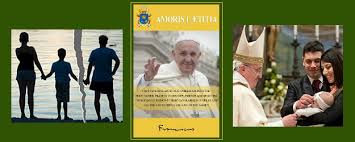Division within Christ’s Church, such as that which exists at
present over Amoris rlaetitia, Pope Francis' post-synodal apostolic exhortation is a clear attack by the evil one. Satan’s strategy here is the
time-honored one of divide et impera – divide
and conquer. Remember Jesus’ words to the Pharisees? “Every kingdom divided
against itself is laid waste, and no city or house divided against itself will
stand.” Quite simply, no ideology, no matter how sincerely embraced, may
substitute for personal conversion, for, in the case of divirced and remarried Catholics, entering the narrow gate.
When Pope Francis
issued Amoris Laetitia it produced a controversy around an unanswered question—whether or not divorced and remarried
Catholics might be admitted to the Eucharist in certain circumstances. At two
synods the proposal, pushed by prelates handpicked by Francis, faced strong
opposition from many bishops and didn’t achieve consensus. The document
produced by the 2015 synod came up with an ambiguous formula, essentially
fudging the issue.
After the synod all
eyes were on The Holy Father to see if he would intervene with a clear
decision. When it arrived, alas the answer, hidden away in two footnotes, was still
ambiguous.
The current fallout
centers largely on how the Pope’s words are to be interpreted. The German bishops’
conferences seems more or less united in favor of liberalizing the discipline,
while Poland’s insists that nothing has changed. The bishops of Buenos Aires wrote
a document suggesting that the way is now open for Communion for the remarried
in some cases where subjective guilt might be diminished. Francis answered with
a private letter commending this interpretation as the right one. In what has
become a familiar aspect of disputes around the Pope’s real intentions, the
purportedly private exchange was leaked – a transparent attempt to give
momentum to the liberalizing tendency.
The division also
divides episcopal conferences internally. Archbishop Charles Chaput of
Philadelphia published norms for his diocese which made it clear that the
discipline there would remain unchanged. Those in irregular unions might
receive Communion only if they lived in continence. Cardinal Kevin Farrell criticized
Chaput and implied that such a policy should be more open to Francis’s favored
“option of mercy”.
Then a letter was made
public, addressed to the Pope by four cardinals in the form of dubia, “doubts”,
traditionally addressed to the competent Roman authority by those seeking
clarification of points of Church teaching or canon law deemed insufficiently
clear.
Of the cardinals
concerned, only one is currently serving, albeit in a role of reduced
importance. He is Cardinal Raymond Burke.The other three cardinals are all
retired.
The dubia made reference to Pope Saint John
Paul the Great’s landmark texts Familiaris
Consortio and Veritatis Splendor. It is evident that its
questions’ intent was to suggest that there are difficulties in reconciling Amoris Laetitia with established
Catholic doctrine.
Because the Pope
refused to response to the four cardinals, they decided to make the dubia public, a seeming direct challenge
to Francis, suggesting that the Holy Father is possibly teaching error.
If Francis were to
state that the principles taught by St John Paul II were no longer part of the
Church’s teaching, he would provoke open revolt among those who cling to the
entire Catholic tradition as it has evolved over the centuries, and relativize his
own teaching authority.
If Francis reaffirms
the previous teaching, then he must either give up his attempts to reform the
discipline of the sacraments, or show that the contradiction is not a reversal
of former teaching but a development of doctrine, which it is not.
Challenging the
judgments of a pope doesn’t render one a renegade from the Catholic faith. What
is concerning is the anti-intellectualism which seems present in those in favor
of the heterodox view. One such shepherd admonished the four cardinals for
making “sophisticated arguments,” as if this were a sin. Pope Francis has said
that “realities are greater than ideas”. This is indicative of Pope Paul VI’s
view, outlined in my book, that a contempt for rationality and logical
discourse risks handing over the Church to the reign of the emotive and the
sentimental in a way which cannot in the end sustain its efforts to evangelize,
which is the Devil’s primary desire. Paul wrote:
He (the Devil) is the malign, clever
seducer who knows how to make his way into us through the senses, the
imagination and the libido, through utopian logic, or through disordered social
contacts in the give and take of our activities, so that he can bring about in
us deviations that are all the more harmful because they seem to conform to our
physical or mental makeup, or to our profound, instinctive aspirations.
Popes are human beings
whose job is to teach Christian doctrine, and in cases of necessity to
intervene to restore unity on the basis of truth. They can make errors of
judgment in pursuing this task, as they have in the past and doubtless will in
the future. They teach and govern in union with their collaborators – the
bishops – who have a role in advising them and, if necessary, urging caution.
Pope Francis has
chosen to open a debate, and as shepherds of the faithful he or one of his
successors will be called upon to close it with the help of His brother bishops.
Oremus.




Comments
Post a Comment